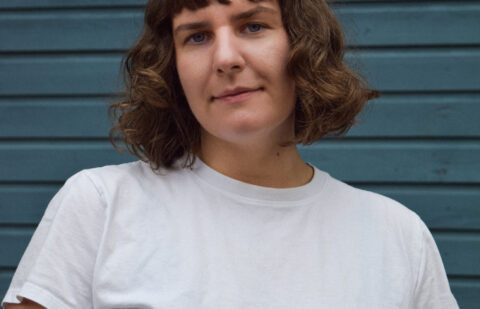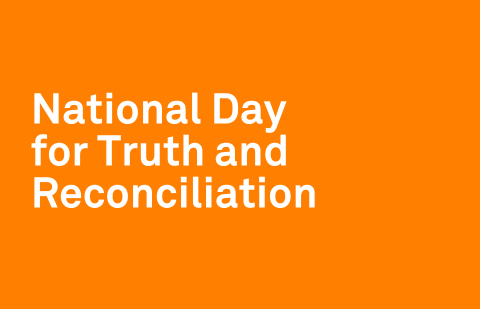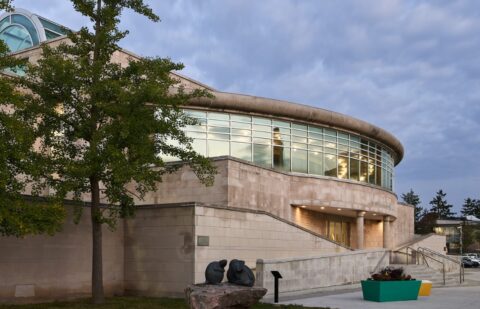In August, our team started talking about how we wanted to mark the National Day for Truth and Reconciliation. After open discussion we decided to honour its intention as described in the 80th Call to Action in the Truth and Reconciliation Commission Report:
“We call upon the federal government, in collaboration with Aboriginal peoples, to establish, as a statutory holiday, a National Day for Truth and Reconciliation to honour survivors, their families, and communities, and ensure that public commemoration of the history and legacy of residential schools remains a vital component of the reconciliation process.”
The RMG will be closed to the public on September 30. The staff team is taking the day to learn, to participate in commemorations, and to continue our commitment to support the self-determination of Indigenous communities. This is what felt right for us organizationally; we wanted to participate in group learning together and to make time to focus on self-education.
We’re grateful for the list of resources generously offered by two members of our team, Samuel Powless (Manager of Visitor Engagement + Facilities) and Erin Szikora (Assistant Curator, Indigenous Projects) which we are sharing with our community. We hope that it provides a starting place or place to continue your own learning.
Miigwech,
Lauren
If you want to learn more about the land we are on
James Whetung Talks About Canada (3:19)
https://decolonialatlas.wordpress.com/2015/04/14/the-great-lakes-in-ojibwe-v2/
https://decolonialatlas.wordpress.com/2015/02/04/haudenosaunee-country-in-mohawk-2/
If you want to learn more about Indigenous culture + teachings
Founding of the Rotinoshón:ni (5:52)
Rotinoshón:ni Governance + Wampum Belts (39:39)
What Does Rotinoshón:ni Reconcilitation Look Like? (14:28)
Haudenosaunee Corn Soup (22:01)
Seven Grandfather Teachings of the Anishinaabe (11:20)
Importance of Birch to the Anishinaabe (22:08)
Richard Hill: Voices from Here (13:04)
If you want to learn more about the Indian Act
What is a status card? (2:14)
The Indian Act Explained (25:35)
How to Talk About Indigenous People (2:37)
If you want to learn more about local treaties
Indigenous Voices on Treaties – Anne Taylor (Curve Lake) (4:17)
Indigenous Voices on Treaties – Doug Williams (Curve Lake) (7:05)
Indigenous Voices on Treaties – Maurice Switzer (Alderville) (7:02)
If you want to learn more about the impacts of colonialism on Indigenous communities
https://indigenousfoundations.arts.ubc.ca/the_residential_school_system/
https://indigenousfoundations.arts.ubc.ca/sixties_scoop/
https://indigenousfoundations.arts.ubc.ca/the_white_paper_1969/
https://indigenousfoundations.arts.ubc.ca/constitution_act_1982_section_35/
If you want learn from some preeminent Indigenous thinkers and knowledge keepers
Vine Deloria Jr. 1972 on politics, metaphysics (51:37)
John Mohawk 2002 on environmentalism (19:47)
Leroy Littlebear 2016 on metaphysics (103:09)
Michi Saagiig Nishnaabeg: This is our Territory a book on traditional Anishinaabe knowledge
If you are looking to learn or read more, here is a selection of websites, resources, and other programming:
National Centre for Truth and Reconciliation at the University of Manitoba https://nctr.ca/
A Special Report published by the Yellowhead Institute: Calls to Action Accountability: A 2020 Status Update on Reconciliation
Learn more about Indigenous-settler relations by taking a FREE course through the Faculty of Native Studies at the University of Alberta
Resources For non-Indigenous People: http://www.trc.ca/resources.html….
Assembly of First Nations – Its Our Time – Residential Schools Toolkit: https://education.afn.ca/…/learnin…/residential-schools/
An Overview of the Indian Residential School System booklet: http://www.anishinabek.ca/…/An-Overview-of-the-IRS…
If you’re a settler, here are some places where you can make a donation to support residential school survivors and their families:
Indian Residential School Survivors Society
Woodland Cultural Centre’s Save the Evidence campaign
National Centre for Truth and Reconciliation
First Nations Child & Family Caring Society
Native Women’s Association of Canada
Gord Downie & Chanie Wenjack Fund
Follow these regionally based organizations on your social media:
Bawaajigwein Aboriginal Community Circle @Bawaajigewin on Facebook
Mississaugas of Scugog Island First Nation @MSIFN on Twitter
If you’re a settler, start following @OnCanadaProject to continue your learning


